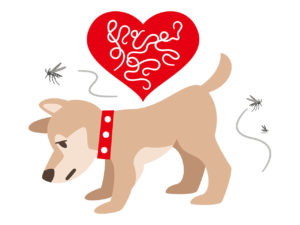How Long Do Dog Worming Tablets Take to Work?
For new dog owners the realization your dog has worms is a scary one. When your dog gets worms, getting rid of them can be a stressful process. Your vet will prescribe you deworming tablets to get rid of your dog worms infestation. It takes between two and six hours for the deworming tablets to take effect. However, it takes longer for all of the worms to die off. We will discuss everything you need to know about dog deworming tablets and the deworming treatment.
Adult Dogs
For adult dogs deworming tablets will begin to take effect between two to six hours of initial administration. However, it can take up to a month for all the worm treatments to ensure the worms are killed. The amount of time it takes to eliminate the worm problem depends on the severity of the worm infestation. There are normal side effects and guidelines to consider when deworming an adult dog.
Deworming Side Effects for Adult Dogs
Your adult dog’s body can have many side effects during the deworming process. Deworming is not always an easy and comfortable process for an adult dog, but it is necessary. Internal parasites can cause dog disease and constant discomfort if not removed when detected.
- During the deworming process, an adult dog may experience weight loss due to loss of appetite during the treatment.
- Deworming tablets can cause adult dogs to vomit.
- Fatigue is expected during the deworming process. The deworming tablets are likely to make adult dogs less energetic.
- Bloated stomach can be caused by deworming treatments.
- If you notice your adult dog coughing during deworming treatments, it can be a side effect of the deworming tablets.
- Irritated skin and changes in fur texture can be indicators of deworming side effects.
If these side effects are chronic or worsen, you need to consult your vet to ensure there are no more severe medical issues. These side effects are also the first signs that your adult dog has worms.
Type of Worms
There is more than one species of worm that a dog can contract. The type of worm your dog is afflicted with would affect the severity of your dog’s physical reactions and the course of treatment they will need. Some common worms and parasites can even transfer to humans in severe cases without the proper precautions. Below are the different types of worms.
Heartworms in Dogs

Preventing Heartworm in Dogs
The best way to prevent your dog from getting heartworm is to understand where it comes from. Dogs usually receive heartworm from mosquitoes, so even if you are not a super outdoorsy person, you need to prevent your dog from catching heartworm. There are several heartworm preventives out there, and your vet can give you a good recommendation for a heartworm preventive.
Unfortunately, because heartworms are distributed to dogs from mosquitoes, it is nearly impossible to avoid the transmitter altogether. Mosquitos can be found even in your backyard, so there is no avoiding it. The only way to effectively prevent your dog from getting heartworms is to get them on a heartworm prevention treatment.
Hookworms in Dogs

Preventing Hookworms in Dogs
Dogs become afflicted by hookworms through their mother’s milk by worm larvae present in their environment. Hookworms are not transported in the air like heartworms are. It is common for dogs in domains where other dogs frequently visit to become afflicted by hookworms. These environments can include parks, shelters, and even daycares.
If you suspect hookworm contamination in the environment, you must quarantine the environment from dogs that are not afflicted. Hookworms spread like wildfire for dogs, and it is straightforward for dogs to catch hookworms if another dog in the atmosphere has them. If you are handling a dog afflicted with hookworms, you must put on protective clothing and wash after to prevent other dogs from becoming afflicted with hookworms.
Whipworms in Dogs

Preventing Whipworms in Dogs
The best way to keep your dog from catching whipworm is to keep the dog’s environment clean. Some dogs enjoy eating the stool of other dogs o the flesh of dead animals, which is the most common way whipworm is transmitted. Whipworms attach their larvae to the stool of an infected dog to spread the affliction.
Tapeworms in Dogs

If you notice your dog biting at its butt or scooching it on the floor more often than usual, you need to take it to the vet. This is often the first indicator that your dog is dealing with a tapeworm infestation. If your vet tests your dog and comes back positive for tapeworm, your dog will be prescribed deworming medication of a chewable tablet to get rid of the parasites.
Preventing Tapeworm in Your Dog
The excellent news about tapeworm is that it is pretty easy to prevent. The best way to prevent your dog’s body from getting tapeworm is to get your dog on a flea preventative. The most common way that dogs get tapeworms is through fleas. There are many flea preventatives, and a vet can help you choose one to best fit your dog’s needs.
Roundworms in Dogs
When discussing the worms that dogs can get, it is essential to bring up roundworms. The main thing separating roundworms from this list of parasites is that humans can be afflicted with roundworms. Roundworms are a parasite that resides in a dog’s stomach and large intestine. Roundworms can cause development problems and death in dogs if left untreated.
The way that vets can detect roundworms in dogs is through a fecal sample. A doctor can spot roundworms in humans just by looking at a person’s skin. Once diagnosed, a vet or a doctor will prescribe a medication to treat the roundworms.
Adult Worms
Many people are under the misconception that worms are only dangerous for young puppies with only weeks of age. However, adult dogs also experience worms, which can be fatal and have lasting medical damage to an adult. Heartworm is primarily known to cause premature death in adult dogs.
If you suspect that your adult dog has worms, it is vital to take them in for treatment. When you neglect to take an adult dog to the vet for parasite treatment, it can lead to more significant medical issues and the spread of parasites.
Months of Age
If you have a puppy under six months of age, it is best to quarantine them to prevent parasites with a regular treatment. Even the most common intestinal worms can kill puppies or severely damage their growth when puppies are too young. Quarantining puppies is especially vital in environments that experience a larger volume of dogs, like animal shelters.
Worm Infestation
When your dog becomes afflicted with parasites, there are a few different ways that the situation can go. It can cause severe illness or death or not have much effect. Age of the dog, underlying conditions, and type of parasite all play a role in this. If you suspect your dog has worms, it is vital to take them to the vet for diagnosis and treatment immediately.
Dead Worms
Usually, dogs won’t show physical signs of the worms dying. While you may see some dead worms with your naked eye in the stool after treatment, this is uncommon. However, this doesn’t mean that the treatment didn’t work. After you have finished the treatment, you should take your dog to the vet to get tested again.
Final Thoughts
If you suspect that your dog is infested with any parasite, it is vital to take them to a vet. A vet will diagnose what kind of parasite your dog may have and set you on a treatment plan to get rid of the parasites. Parasites can cause lasting health effects on dogs and even lead to death. To prevent parasites, keep your dog in clean environments and keep up to date on heartworm oral medication and flea prevention.

